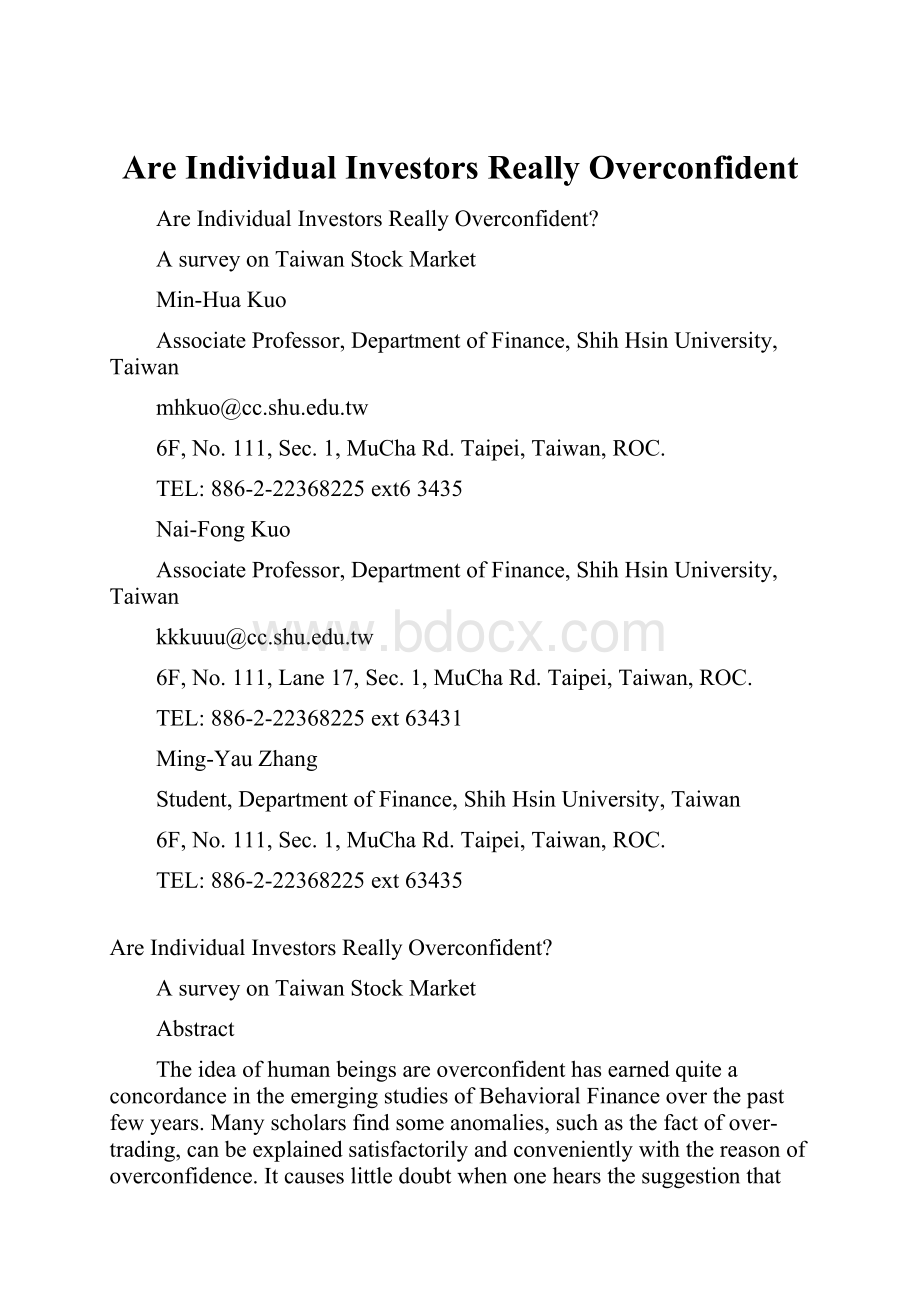Are Individual Investors Really Overconfident.docx
《Are Individual Investors Really Overconfident.docx》由会员分享,可在线阅读,更多相关《Are Individual Investors Really Overconfident.docx(24页珍藏版)》请在冰豆网上搜索。

AreIndividualInvestorsReallyOverconfident
AreIndividualInvestorsReallyOverconfident?
AsurveyonTaiwanStockMarket
Min-HuaKuo
AssociateProfessor,DepartmentofFinance,ShihHsinUniversity,Taiwan
mhkuo@cc.shu.edu.tw
6F,No.111,Sec.1,MuChaRd.Taipei,Taiwan,ROC.
TEL:
886-2-22368225ext63435
Nai-FongKuo
AssociateProfessor,DepartmentofFinance,ShihHsinUniversity,Taiwan
kkkuuu@cc.shu.edu.tw
6F,No.111,Lane17,Sec.1,MuChaRd.Taipei,Taiwan,ROC.
TEL:
886-2-22368225ext63431
Ming-YauZhang
Student,DepartmentofFinance,ShihHsinUniversity,Taiwan
6F,No.111,Sec.1,MuChaRd.Taipei,Taiwan,ROC.
TEL:
886-2-22368225ext63435
AreIndividualInvestorsReallyOverconfident?
AsurveyonTaiwanStockMarket
Abstract
TheideaofhumanbeingsareoverconfidenthasearnedquiteaconcordanceintheemergingstudiesofBehavioralFinanceoverthepastfewyears.Manyscholarsfindsomeanomalies,suchasthefactofover-trading,canbeexplainedsatisfactorilyandconvenientlywiththereasonofoverconfidence.Itcauseslittledoubtwhenonehearsthesuggestionthatinvestorsareoverconfident.However,wemayhaveasecondthoughtifthinkitcarefully.Investmentishighlycomplicated,filledwithuncertainlyandgivesquickfeedback,isitnotmorelikelythattheinvestorswillfeelunderconfident,insteadofoverconfident,towinoverthisgame?
Inthisstudywepresentevidencestoshowthatinvestorsdorevealthedispositionofoverconfidenceingeneralcases,however,theyturnintodiffidenceinthesituationofinvestment.Moreover,wefindnoconsistentevidencetosupporttheargumentofoverconfidenceleadingtoovertrading.Thetradingfrequencyhasnothingtodowithconfidence.Whetherpeopletendtooverconfideseemstodependon,atleastpartly,thescenario’sfeature.Whenfacingasituationofgreatuncertaintyandcomplication,peopletendtobeunder-confident,insteadofoverconfident.TheanalysisisbasedonanationwidesurveyonindividualinvestorsinTaiwanstockmarket.Thesamplingerrorislowerthan3%.
Introduction
ThatpeopleareinclinedtobeoverconfidenthasearnedquiteaconcordanceinthefieldsofPsychologyandBehavioralFinance.ThemeasurementsofoverconfidenceusedinPsychologyaremultifold,includinginterviewandexperiments.ThewaytoclaimconfidenceintheBehavioralFinance,however,isofindirection.Itdoesnotofferevidencesto“prove”thatpeopleareoverconfident,instead,itborrowsthispopularbelieftoexplainwhyinvestorsovertrade.TaketheexamplesoftheeminentseriesofpaperauthoredbyOdeanandBarber,amongothers.Theyexploreindividuals’investmentbehaviorsbytheuseofastockbroker’sclientaccounts.Oneoftheirmainsuggestions,besidesmanyothervaluableinsights,isthatoverconfidenceleadsinvestorstoovertradingwhentheyfindthatovertradingishazardoustotheinvestmentreturns.Maleinvestorstrademorefrequentlythanfemalebecausetheyaremoreoverconfidentthanfemale.Itcauseslittledoubtwhenonehearsthesuggestionthatinvestorsareoverconfident,maybebecausewearesubjecttotheanchoringeffect(anchoredbythepopularbeliefthatpeoplearealwaysoverconfident)orbecausemostofusdohavethesimilarexperienceindailylife.However,wemayhaveasecondthoughtifthinkitcarefully.Investmentissuchaknowledgeintensiveactivityandfilledwithuncertainly,andfeedbacksfast,isitnotmorelikelythattheinvestorswillfeelunderconfident,insteadofoverconfident,towinoverthisgame?
Withthefactthatsomanypotentialcausescouldmakeaninvestortrademore(suchasinvestmentstrategies,liquidityneeds,portfoliobalance,ortheindividual’spersonalityofinner/outercontrol,etc.),whatisthesolidgroundsallowingustoclaimthatoverconfidence,insteadofdiffidenceorfear,makespeoplemove?
Amorerefinedresearchintoinvestors’attitudesisneededbeforeweareentitledtomakeanyclaimabouttheirover(orunder)confidence.
WeutilizethenationaldatabankoftheInvestorSentimentIndexinTaiwanmadebyShihHsinUniversity.ItisanationwidebimonthlysurveyoftheindividualstockinvestorsinTaiwan,withsamplingerrorkeptbelow3%.Inthestudy,adelicatelydesignedquestionsetisaskedtodistinguishtheself-confidenceindifferentsituations.Weendeavortoanswerthequestions:
Areinvestorsreallyoverconfident?
Doestheself-confidencevaryoverdifferentdomains(suchasinthegeneralsituationvs.intheinvestmentscenario)?
Isitappropriatetoclaimoverconfidencebyovertrading?
Accordingtoouranalysis,investorsdoshowthedispositionofoverconfidenceingeneralcases,however,theyturnintodiffidenceregardinginvestment.Moreover,wefindnoconsistentevidencetosupportthatoverconfidenceleadstoovertrading.Thetradingfrequencyhasnothingtodowithconfidence.Whetherpeopletendtooverconfidemaydependonthescenario’sfeature.Whenfacingasituationofgreatuncertaintyandcomplication,peopletendtobeunder-confident,insteadofoverconfident.
Thearticlestructureisarrangedasfollows:
Thefirstsectionisintroduction,introducingtheresearchbackgroundandthegapremainstofill.Thenliteraturereviewfollows.Thethirdandfourthsectionsexplainrespectivelythemethodologyinuseandtheempiricalresults.Conclusionscomeinthefinalsectionandtheimplicationoftheresearchisdiscussedtheretoo.
Literaturereview
FollowingtheemergenceandrapiddevelopmentofBehavioralFinance,therolesofinnerattitudeshaveearnedgreatattention.Amongthem,overconfidenceisprobablytheonediscussedmostanddebatedleast[seeThaler,1995;DeBondtandThaler,1990;Daniel,Hirshleifer,Subrahmanyan,1998;GervaisandOdean,1998;DeLong,1993;DeBondt,1993;KahnemanandRiepe,1998,etc.].Mostpeopledoshowoverconfidentabouttheirownrelativeabilities,andunreasonablyoptimisticabouttheirfutures,accordingtothepsychologicalandexperimentaleconomicsstudies.Whenassessingalmostanypositivetraits,avastmajorityofpeoplebelievetheyareabovetheaverage,althoughonlyhalfcanbe(ifthetraitissymmetricallydistributed).Thatis,peopleseemtobelievetheyaremoreskillfulthantheyreallyare[e.g.,Svenson,1981;Weinstein,1980;TaylorandBrown,1988;Lichtenstein,FischhoffandPhilips,1982].Byquestionnairesurvey,Lichtenstein,FischhoffandPhilips[1982]findthatpeopleveryoftenoverestimatetheprobabilityofcorrectnessoftheiranswers.evenwhentheyare“sure”theiranswersarecorrect,ashighas20%ofthemareactuallywrong.Usinggamesofskill,CamererandLovallo[1999]reportonoverconfidenceinbusinessentrydecisions.Asubel[1991]analyzesmarketdataandindicatesthatthecreditcardholdersbeingoverconfidentabouttheirfutureabilitytoavoidoverdrawnaccounts.Theevidenceofoverconfidenceisabundant.
Asfortherelationbetweenoverconfidenceandinvestmentbehavior,someresearchersattempttobuildtheoreticalmodelsandothersdoempiricalanalysis.Fortheformer,Daniel,HirshleiferandSubrahmanyam[1998]proposethatindividualinvestorsareoverconfidentwhentheyoverestimatethecorrectnessoftheirprivateinformation.Odean[1998]proposesastaticmodelandshowsthattheoverconfidenceofinvestorsraisesbothmarkettradingvolumeandpricevolatility,andthusexpectedutilityarereducedandunnecessarysociallossarebroughtabout.Whentheinvestorsoverestimatetheprecisionoftheirprivateinformation,theytendtooveract;thepriceswillnotbacktotheequilibriumuntiltherealityreveals.Thereforethemarketpricevolatilityandlong-termreturnsarenegativerelated.
Regardingtheempiricalstudies,mostpapersinferinvestorstobeoverconfidentbecausetheobviousfactofover-tradingandtheassociatenegativeeffectsonreturns.Forexample,BarberandOdean[1999]findthatindividualinvestorstrademuchmorethanexpectedandtheysuggestitisduetotraders’overconfidence.Theyalsoinvestigatethetradingdatafrom166investmentclubsin1991-1997,andfindtheinvestorsnotonlytradeveryoftenbutpreferhigh-risksmallfirms[BarberandOdean,2000a].Thereturnstheygetseemnotverysatisfactory:
60%ofthemarebelowthemarketaverage,whichtheauthorsbelieveatleastpartlythankstooverconfidence.Furthermore,theyexamine35,000tradingaccountsfromanationalsecuritybrokerandreportthattheaverageturnoverofmaleishigherthanfemale,causingmale’sinvestmentreturnslessby2.65%thanthegrossreturns,morethanthatof1.72%offemale.Again,theauthorssuggestitisbecausemaleismoreoverconfidentthanfemale[BarberandOdean,2000b;BarberandOdean,2001].StatmanandThorley[1999]proposethathighreturnscauseoverconfidence,whichleadstoover-trading,and,itinteractsfurtherwithdispositioneffect,bringingabouttheDisposition-Overconfidenceeffect.Thatis,highvolumesarerelatedwiththehighreturnsweeksormonthsago,whilelowvolumeswithhighvolatilitiesweeksormonthsago.ChuangandLee[2006]buildupVARandGARCHmodelstoproposethatoverconfidentinvestorsoveractonprivateinformationbutunderactonpublicinformation.Theoverconfidentinvestorstradetoomuchandwhichleadstoover-volatility:
theoverconfidentinvestorsapttounderestimateriskandthustradetoomuchontheriskysecurities.Theyareevenmoreoverconfidentaftermakingprofitsandthentradefurthermore,inaccordancewithwhatStatmanandThorley[1999]report.Still,Bengtsson[2005]makeuseofquestionnairetoinvestigatethestudentsofStockholmUniversityandcomparetheoptimismandconfidencebetweenmaleandfemale.Theyfindthatmalearemoreo